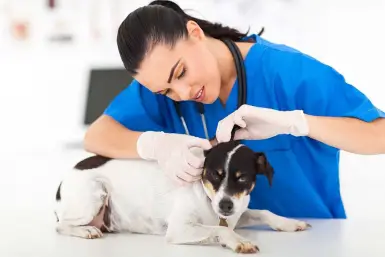
Dog News and Advice
Browse Categories
- Dog Boot Camps
- Test
- Test
- Dogs Please Clicker Training
- Pet Insurance Comparison
- Exercising Pets With An E Scooter
- 10 Reasons Why Guinea Pigs Are Wholesome Little Pets
- Why You Should Use a Shed to House Your Pet
- How can Dog Owners Keep their Carpets Clean?
- How to Keep Your House in Order With Large Pets
- What is the Best Way to Feed a Puppy to Keep Them Healthy
- Pets Please
- All Animals and Pets
- Dogs and Puppies
- Cats and Kittens
- Birds
- Fish
- Reptiles
- All Other Small Pets
- Claws 'N' Paws Events
- PetsInLimbo/Greys4PetsInc.
News Search
PetsPlease News and Advice
Is my dog sick.
Published on Wednesday, February 19, 2014 in Dogs and Puppies
Your canine companion can’t always express himself when it’s ill. It jumps at you to express happiness upon seeing you. It sniffs on a person’s clothing or skin to say it’s trying to know them. It wags its tail when it recognizes someone. If one day it doesn’t get up to greet you, you should observe it for signs of illness. Your pet’s silence or non-appearance should be your first clue that something’s up with your pup. Here are more signals that your pet could be sick.
- A sudden change in your pet’s eating habits may indicate a health condition. If your dog is suddenly eating too much and it’s disproportionate to the calories it burns, it probably has a vitamin deficiency. In extreme cases, a dog may even go as far as eating anything it could get its paws on. On the other hand, a dog that suddenly loses appetite could be in pain, it must have fever or it is stressed. A dog that will not touch its food for 2 consecutive meals is a red flag it is definitely suffering. Give it as much water as you could if you can’t take it to the vet right away. You could also take its temperature and then give your vet a call.
- Lethargy is when your dog’s energy suddenly drops which could arise after a long run at the park. But if no activity of that sort that happened and your dog is unusually slumped on the ground and even unresponsive to treats, a trip to the vet is necessary.
- Chronic coughing is something to be taken seriously. Dog cough may be caused by an infectious tracheo-bronchitis or kennel cough which starts as a mild sickness and progress to a deadly canine pneumonia. Once you hear a hacking sound from your dog, get it treated right away and have your dog thoroughly evaluated for heart disease, lung disease or heartworms.
- A pup with persistent sneezing and nasal discharge might be developing a lung infection. It will be accompanied with eye and ear discharge, fever, loss of appetite, difficulty in breathing and productive cough.
- In a worst case scenario, a dog that will discharge fluids through vomiting, diarrhea or bleeding need immediate medical attention. It may have ingested poison or swallowed a sharp object that’s causing the symptoms. Vomiting and diarrhea could also be caused by a gastro-intestinal illness or parasite infections.
Always consult your vet when you suspect your fury friend isn't well.
Disclaimer: Every effort has been made to make the Site as accurate as possible.
You acknowledge that any reliance upon any advice, opinion, statement, advertisement, or other information displayed or distributed through the Site is at Your sole risk and We are not responsible or labile for any loss or damage that results from the use of the information on the Site.
We reserve the right in Our sole discretion and without notice to You to correct any errors or omissions in any portion of the Site.
